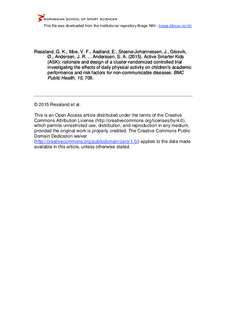| dc.contributor.author | Resaland, Geir Kåre | |
| dc.contributor.author | Moe, Vegard Fusche | |
| dc.contributor.author | Aadland, Eivind | |
| dc.contributor.author | Steene-Johannessen, Jostein | |
| dc.contributor.author | Glosvik, Øyvind | |
| dc.contributor.author | Andersen, John Roger | |
| dc.contributor.author | Kvalheim, Olav Martin | |
| dc.contributor.author | McKay, Heather A. | |
| dc.contributor.author | Anderssen, Sigmund A. | |
| dc.date.accessioned | 2016-02-18T09:07:28Z | |
| dc.date.available | 2016-02-18T09:07:28Z | |
| dc.date.issued | 2015-07-28 | |
| dc.identifier.citation | BMC Public Health. 2015,15, 709. doi:10.1186/s12889-015-2049-y | nb_NO |
| dc.identifier.uri | http://hdl.handle.net/11250/2379458 | |
| dc.description | © Resaland et al. 2015
This is an Open Access article distributed under the terms of the Creative Commons Attribution License (http://creativecommons.org/licenses/by/4.0), which permits unrestricted use, distribution, and reproduction in any medium, provided the original work is properly credited. The Creative Commons Public Domain Dedication waiver (http://creativecommons.org/publicdomain/zero/1.0/) applies to the data made available in this article, unless otherwise stated. | nb_NO |
| dc.description.abstract | Background: Evidence is emerging from school-based studies that physical activity might favorably affect children’s
academic performance. However, there is a need for high-quality studies to support this. Therefore, the main
objective of the Active Smarter Kids (ASK) study is to investigate the effect of daily physical activity on children’s
academic performance. Because of the complexity of the relation between physical activity and academic
performance it is important to identify mediating and moderating variables such as cognitive function, fitness,
adiposity, motor skills and quality of life (QoL). Further, there are global concerns regarding the high prevalence of
lifestyle-related non-communicable diseases (NCDs). The best means to address this challenge could be through primary
prevention. Physical activity is known to play a key role in preventing a host of NCDs. Therefore, we investigated as a
secondary objective the effect of the intervention on risk factors related to NCDs. The purpose of this paper is to describe
the design of the ASK study, the ASK intervention as well as the scope and details of the methods we adopted to evaluate
the effect of the ASK intervention on 5th grade children.
Methods & design: The ASK study is a cluster randomized controlled trial that includes 1145 fifth graders (aged
10 years) from 57 schools (28 intervention schools; 29 control schools) in Sogn and Fjordane County, Norway. This
represents 95.3 % of total possible recruitment. Children in all 57 participating schools took part in a curriculumprescribed
physical activity intervention (90 min/week of physical education (PE) and 45 min/week physical activity, in
total; 135 min/week). In addition, children from intervention schools also participated in the ASK intervention model
(165 min/week), i.e. a total of 300 min/week of physical activity/PE. The ASK study was implemented over 7 months,
from November 2014 to June 2015. We assessed academic performance in reading, numeracy and English using
Norwegian National tests delivered by The Norwegian Directorate for Education and Training. We assessed physical
activity objectively at baseline, midpoint and at the end of the intervention. All other variables were measured at
baseline and post-intervention. In addition, we used qualitative methodologies to obtain an in-depth understanding of
children’s embodied experiences and pedagogical processes taking place during the intervention. Discussion: If successful, ASK could provide strong evidence of a relation between physical activity and academic
performance that could potentially inform the process of learning in elementary schools. Schools might also be
identified as effective settings for large scale public health initiatives for the prevention of NCDs. | nb_NO |
| dc.language.iso | eng | nb_NO |
| dc.publisher | BioMed Central | nb_NO |
| dc.subject | cluster-randomized trial | nb_NO |
| dc.subject | children | nb_NO |
| dc.subject | academic performance | nb_NO |
| dc.subject | cognitive functions | nb_NO |
| dc.subject | executive functions | nb_NO |
| dc.subject | non-communicable diseases | nb_NO |
| dc.subject | physical activity | nb_NO |
| dc.subject | sedentary behavior | nb_NO |
| dc.subject | cardiorespiratory fitness | nb_NO |
| dc.subject | quality of life | nb_NO |
| dc.title | Active Smarter Kids (ASK): rationale and design of a cluster-randomized controlled trial investigating the effects of daily physical activity on children's academic performance and risk factors for non-communicable diseases | nb_NO |
| dc.type | Journal article | nb_NO |
| dc.type | Peer reviewed | nb_NO |
| dc.subject.nsi | VDP::Medical disciplines: 700 | nb_NO |
| dc.subject.nsi | VDP::Medical disciplines: 700::Health sciences: 800 | nb_NO |
| dc.source.journal | BMC Public Health | nb_NO |
| dc.description.localcode | Seksjon for idrettsmedisinske fag / Department of Sports Medicine | nb_NO |
